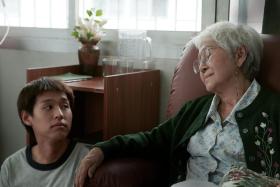Sophie Turner digs deep into mental illness for X-Men: Dark Phoenix
X-Men: Dark Phoenix star Sophie Turner spent six months preparing for role
It's good to be Sophie Turner right now.
Hit TV series Game Of Thrones recently ended its triumphant eight-season run and the 23-year-old English actress, as Sansa Stark, got to be Queen of the North.
Next up is the final instalment of the X-Men franchise, Dark Phoenix, where she plays the most powerful character among the X-Men.
Then there was the quickie wedding to Joe Jonas in Las Vegas the night the 29-year-old US singer performed with his brothers at the Billboard Awards on May 1, where she was in the front row merrily singing along.
We met at the London West Hollywood hotel to talk about Dark Phoenix, which opens here on June 6 and sees Turner reprising her role as the telepathic and telekinetic mutant Jean Grey from 2016's X-Men: Apocalypse.
In this sequel, the X-Men are now celebrities, saviours of the human race.
Their latest mission is to rescue some stranded astronauts, but disaster strikes when a mysterious cosmic force overwhelms Jean and imbues her with powers beyond her control and beyond anyone's understanding.
These powers cause her to become aware of secrets from her past and she becomes increasingly destructive, creating a catastrophe that rips apart the X-Men.
Some of them are determined to get revenge for her act; others are bent on saving her.
James McAvoy, Jennifer Lawrence, Michael Fassbender and Nicholas Hoult return to the cast, while Jessica Chastain plays the new villain.
Simon Kinberg, who wrote the screenplays for X-Men: The Last Stand (2006), X-Men: Days Of Future Past (2014) and X-Men: Apocalypse, makes his directorial debut with Dark Phoenix, which he also wrote.
It focuses more on the relationships of the X-Men than the action of the previous movies.
Turner said: "One of the things that I loved the most was the fact that not only were there so many incredibly powerful female characters, but the female protagonist was also the antagonist. And I thought that was a really exciting concept.
"The thing about the Jean Grey / Dark Phoenix story is that she's not a villain, but she's not a superhero who's going to save the world and everything's fine. She's one of the few characters who's very tormented and broken. Her experiences remind you of mental illness. It's a struggle that's very true for a lot of people and that's why people love her."
Turner herself suffered from depression for over five years while working on Game Of Thrones, and has detailed how body shaming and hateful criticism on social media affected her mental health.
With the help of Jonas and therapy, she was able to work through it.
Turner and Kinberg spent six months preparing for Dark Phoenix, "going back and forth with different ways to ground Jean and make her resonate with people a lot easier because (these movies) can be quite fantastical".
INTENSE
She researched mental illness, particularly schizophrenia and dissociative identity disorder.
"It was intense. I worked with my acting coach for weeks. And Simon and I rehearsed, rehearsed, rehearsed for weeks as well."
There was another interesting bit of prep.
"I had this video on my phone, it was about how it feels to have auditory hallucinations as a schizophrenic. I would put it in my ears, put my headphones on and walk around and just try and do mundane, everyday things. I would try and go shopping and buy things while I was hearing people talking in my head."
Of course, a superhero movie has to have action, but Turner didn't have that many stunts.
"I'm telekinetic and I can do everything like this," she said, flapping her hands.
"There's a scene where I'm turning this helicopter over on its side and that was really happening. We really had a helicopter there. When the thing's spinning and I was going like this (she gestures), they actually tipped the helicopter over. It was amazing. No green screen. No tennis ball on a stick."
Despite its ills, a presence on social media is a must for movie stars these days and Turner has 13.3 million followers on Instagram.
But she is very aware of the platform's downside.
"Social media can be a very unrealistic place, where everything is Photoshopped and edited. People feel that they're not satisfied with their lives and bodies, and they have to live up to something that is just unattainable. In that way, it can affect your mental health and it can be quite dangerous."
Turner has used her fame to support charities that are meaningful to her, like Women For Women, which helps victims of war crimes, especially rape, in less developed countries rebuild their lives.
She said: "Mental health is also something that I feel very, very strongly about, and I would like to, in the future, either be aligned with a charity that supports mental health or create my own. That's my goal."
The writer is the president of the Hollywood Foreign Press Association, a non-profit organisation of entertainment journalists that also organises the annual Golden Globe Awards.
Get The New Paper on your phone with the free TNP app. Download from the Apple App Store or Google Play Store now



